Personality Quiz
Who Do You Think You Are?
And What Makes You So Special?
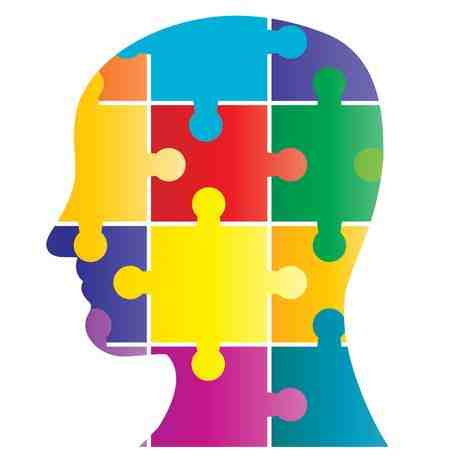
A personality quiz comprises a list of questions designed to reveal something about the participant.
There are a large number of personality quizzes available online and many of these are, to put it bluntly, trivial and intended for (or at least only suitable for) entertainment purposes.
The overall focus of this site all about knowing how to think effectively and improve the outcomes that you experience in your life by improving your responses to the events that impact you.
In summary, the stronger your response - the better the outcome.
A key component of this is developing a level of self-knowledge and understanding how your mind works.
In this context, these assessment tools are useful from the perspective of understanding:
- The drivers in our motivation as individuals
- The difference in our individual motivational drivers
- Individual differences in our mental processing functions
Through the intelligent use of the personality quiz we can gain valuable
insights into how we function as individuals and particularly how,
where and why we differ from each other in why we do things and how we
think.
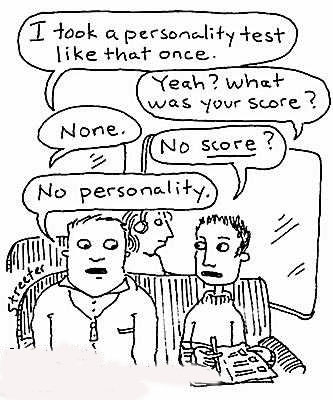
Balance is essential
As with all things, a balanced approach to this is necessary.
Criticisms are sometimes made of a particular approach on the basis that "people can’t be shoe-horned in one or other simple category – we are more complex than that".
This is of course true, but nevertheless we can gain helpful insights and perspectives from these personality quizzes and tests.
Another lack of balance occurs with some people who tend to "over-interpret" results and this is also unhelpful.
So it is important to remember that these approaches and tools are aids to understanding overall personality, preferences, strengths and processing styles - and this is always a subtle and complex mixture in each individual person.
Quizzes and assessment tools
Here is a cross-section of some of the main personality quizzes and assessment tools. Again, may I remind you that we are looking at this through the lense of managing personal change in an organisational change management context, so this is a very high-level summary.
For more in depth information please follow up the various links to external resources that are provided below.
I have also included links to a number of free on-line personality quizzes based on these assessment tools.
Myers Briggs Personality Types
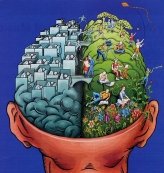
Why understanding type differences is so important in change management
"Whatever the circumstances of your life, the understanding of type can make your perceptions clearer, your judgements sounder and your life close to your heart's desire."
[Isabel Briggs Myers]
The Myers Briggs [personality or psychological] Type Indicators are based on the of work of Carl Jung, in which he developed theories to attempt to explain the differences between normal healthy people.
Jung concluded that differences in individual behaviour are the result of innate tendencies that people in the manner in which they use their minds, and that they tend to do in quite different ways.
Myers Briggs types are based on 8 basic mental functions observed by Jung. The initial observation was that people's minds (when active) are involved in receiving information and processing information. This then developed into a recognition of the different ways people receive, process and interpret that information.
Full in-depth resources here: Myers Briggs Type Indicators
Free Online test - Identify Your Type with Jung Typology Test
The Enneagram
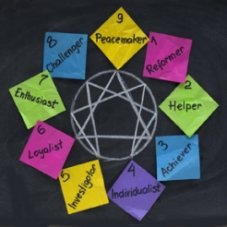
The Enneagram of Personality Types was created by Oscar Ichazo. It amalgamates themes and elements of a number of wisdom traditions.
The Enneagram features nine distinct personality types.
The enneagram system suggests that we each of us is born with a dominant, and unchangeable, personality type which shapes how we adapt to our early childhood environment.
A more detailed overview on this site, and further resources including free tests can be found here: Enneagram of Personality Types
Benziger Thinking Styles Assessment
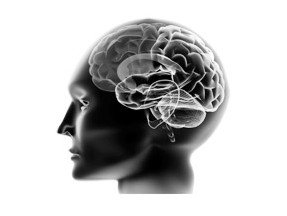
Dr Katherine Benziger takes a completely different approach to the assessment of personality and thinking styles and focuses on the physiological and neurological aspects of how our brains actually function rather than the theoretical and philosophical basis of most psycho-metric tests.
For full indepth resources (including tests) see:
Benziger Thinking Styles Assessment
Howard Gardner's Multiple Intelligence Theory
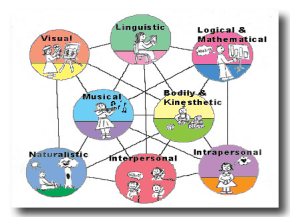
The multiple intelligence theory postulates that we each have a
preferred learning style. This is a cognitive perspective of human
nature. It suggests that in addition to our natural strengths and
behavioural patterns we develop our own individual method of learning.
This theory is grounded in an expanded view of traditional definitions of intelligence.
Gardner's theory suggests that people possess a set of multiple intelligences, and he identifies seven intelligences.
For full in-depth resources (including tests)see:
Multiple Intelligences.
Further Resources
Here is another research based personality quiz that is available online together with extensive resources: The Big Five Personality Test
This site is not about personality quizes but "90 Visual Phenomena & Optical Illusions". This is not a gimmick and is a serious and very interesting site that powerfully and visually demonstrates the limits of our visual perceptions: 90 Visual Phenomena & Optical Illusions
Return to: Managing Personal Change
LATEST ARTICLES
Does Prayer Work? The Psychology of Prayer, Meditation and Outcomes
 Reality Is A Complex System Of Countless Interactions - Including Yours. So does prayer work? The problem is that the question itself is usually framed in a way that guarantees confusion. We tend to a…
Reality Is A Complex System Of Countless Interactions - Including Yours. So does prayer work? The problem is that the question itself is usually framed in a way that guarantees confusion. We tend to a…Living in Survival Mode Without Surrendering Mental Authority
Living in Survival Mode Without Surrendering Mental Authority
 Clear Thinking When You’re Just Trying to Stay Afloat. Many people today are overwhelmed because they are living in survival mode - not temporarily, but as a persistent condition of life. For many, th…
Clear Thinking When You’re Just Trying to Stay Afloat. Many people today are overwhelmed because they are living in survival mode - not temporarily, but as a persistent condition of life. For many, th…Manifestation Without Magic: A Practical Model
 Manifestation without magic is not a softer or more intellectual version of popular manifestation culture. It is a different model altogether. Popular manifestation teachings tend to frame reality as…
Manifestation without magic is not a softer or more intellectual version of popular manifestation culture. It is a different model altogether. Popular manifestation teachings tend to frame reality as…Staying Committed When You Can't See Progress - The Psychology of Grit
 Uncertainty Is Not The Absence Of Progress, Only The Absence Of Reassurance. One of the most destabilising experiences in modern life is not failure, but uncertainty and staying committed when you can…
Uncertainty Is Not The Absence Of Progress, Only The Absence Of Reassurance. One of the most destabilising experiences in modern life is not failure, but uncertainty and staying committed when you can…The Battle For Your Mind - How To Win Inner Freedom In A Digital Age Of Distraction
 From External Events to Inner Events. We often think of “events” as things that happen out there: the traffic jam, the rude comment, the delayed email reply. But what truly shapes our experience is wh…
From External Events to Inner Events. We often think of “events” as things that happen out there: the traffic jam, the rude comment, the delayed email reply. But what truly shapes our experience is wh…How to See Your Thoughts Without Becoming the Story
 A Practical Guide to Thought-Awareness. You can spend your life inside the stories of your mind without ever learning how to see your thoughts clearly and objectively. Most of the stuff we tell oursel…
A Practical Guide to Thought-Awareness. You can spend your life inside the stories of your mind without ever learning how to see your thoughts clearly and objectively. Most of the stuff we tell oursel…The Collison Decision Matrix - A Simple Framework for Better Choices
 The Collison Decision Matrix Is A Practical Everyday Thinking Tool. Most of us spend a surprising amount of time worrying about decisions. From small ones such as what to wear, what to eat, what to te…
The Collison Decision Matrix Is A Practical Everyday Thinking Tool. Most of us spend a surprising amount of time worrying about decisions. From small ones such as what to wear, what to eat, what to te…The Power Of Asking The Right Question
 The Power Of Asking The Right Question Lies In The Quest For Insight. To experience the power of asking the right question you must develop the practice of asking questions. The best way to improve th…
The Power Of Asking The Right Question Lies In The Quest For Insight. To experience the power of asking the right question you must develop the practice of asking questions. The best way to improve th…Site Pathways
 Here is a site pathway to help new readers of Zen-Tools navigate the material on this site. Each pathway is based around one of the many key themes covered on this site and contain a 150 word introduc…
Here is a site pathway to help new readers of Zen-Tools navigate the material on this site. Each pathway is based around one of the many key themes covered on this site and contain a 150 word introduc…How To Live With Contradiction - Beyond Thought Let Stillness Speak
 A major impact on so many peoples' lives is the situational contradiction of unfilled realistic expectations. So where does all this leave us? Well here we are, with mental equipment that is more lim…
A major impact on so many peoples' lives is the situational contradiction of unfilled realistic expectations. So where does all this leave us? Well here we are, with mental equipment that is more lim…How To Trust The Process Of Mindfulness - Right Now
 In mindfulness, the process isn’t some distant goal — it's what is happening right now. When we talk about how to trust the process of mindfulness the credibility of the process is heavily dependent…
In mindfulness, the process isn’t some distant goal — it's what is happening right now. When we talk about how to trust the process of mindfulness the credibility of the process is heavily dependent…